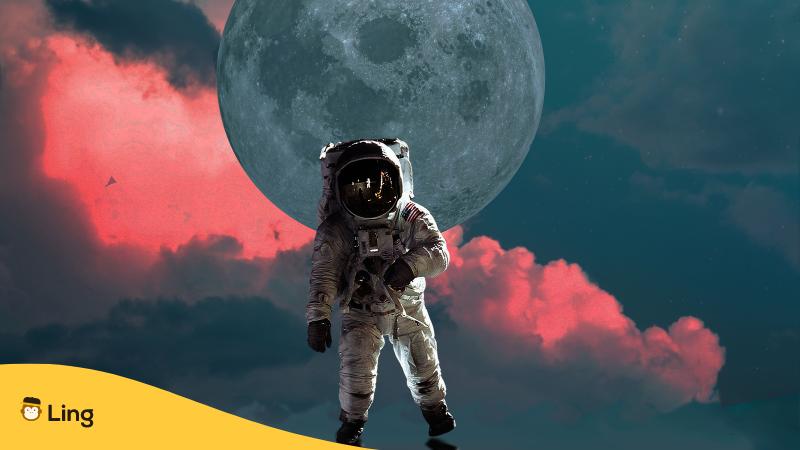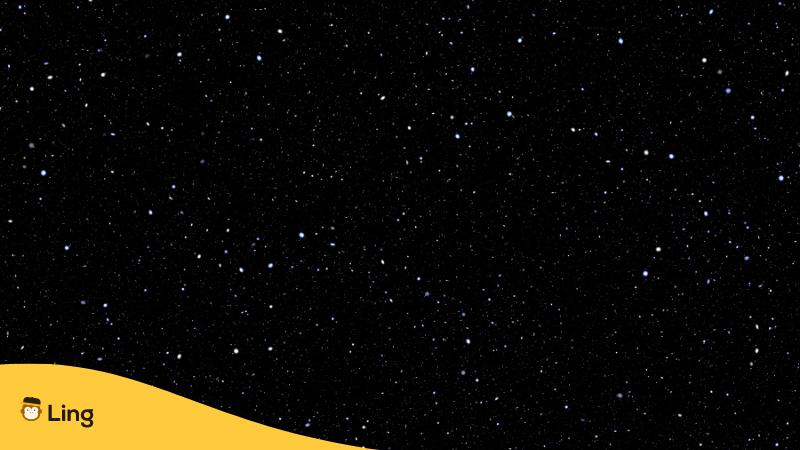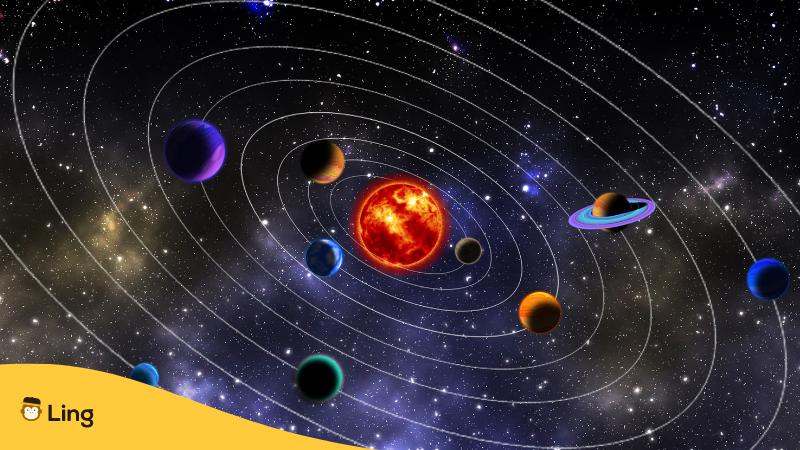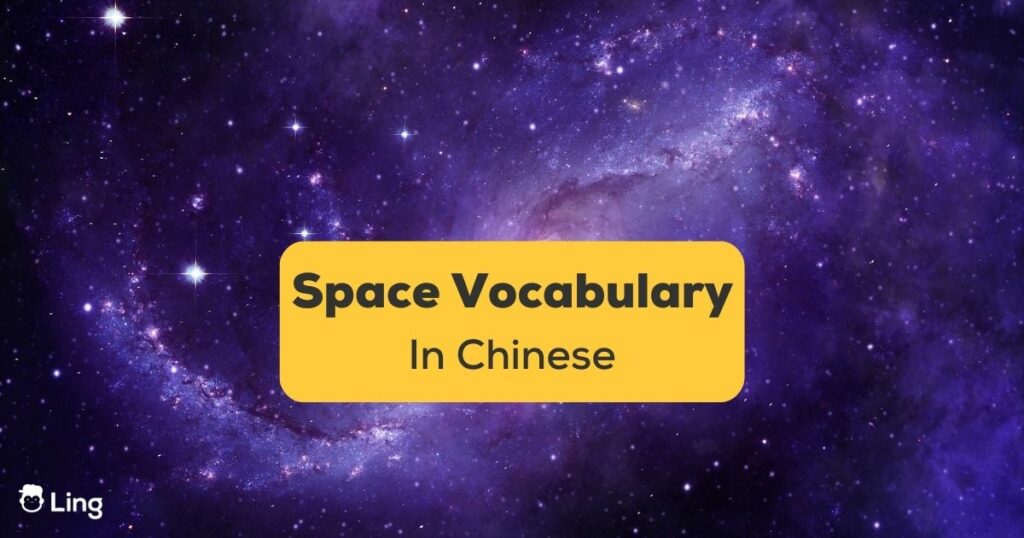Ready to blast off into a world of intergalactic language! In this article, we’ll delve into the cosmic vocabulary of the Chinese language, exploring words from the realms of spacecraft and satellites to the strategic terms used in mission planning. Whether you’re a die-hard space buff or just eager to expand your knowledge of the Chinese language, this article will surely take you on a journey of linguistic discovery by discussing space vocabulary in Chinese.
For centuries, space exploration has ignited the fire of imagination in people all around the globe. As China continues to soar to new heights in the realm of space, which is Kōngjiān (空间 in simplified and 空間 in traditional), it’s crucial to have a solid grasp of the basic lingo of this thrilling industry.
A journey to the stars is just the beginning! According to the latest news, China’s space program has come a long way since its early days, and the country is now a leading player in the global space race. With numerous successful missions and groundbreaking achievements, the CNSA is poised to continue pushing the boundaries of space exploration and scientific discovery. China’s journey to the final frontier of space is just beginning, and the country is poised to make many more exciting discoveries in the future.
China has embarked on a thrilling journey to the final frontier of space and has accomplished some truly remarkable feats. From the launch of the Tiangong-1 which is Tiāngōng yīhào (天宫一号 in simplified and 天宮一號 in traditional) space laboratory in 2011 to the successful landing of the Chang’e 4, which is Cháng’é sì hào (嫦娥四号 in simplified and 嫦娥四號 in traditional) spacecraft on the far side of the Moon in 2019, China’s space program has come a long way since its inception in the early 1950s. Today, the country is one of the leading players in the global space race, and its journey to the stars has only just begun.
The China National Space Administration (CNSA)
The CNSA is the official body that oversees China’s space activities. Established in 1993, the CNSA has been at the forefront of planning and executing missions to space, from manned and unmanned spaceflights to satellite launches and scientific research. The CNSA also manages China’s space infrastructure, including launch sites, ground control stations, and space tracking and data acquisition networks, ensuring the country has the tools it needs to continue exploring the cosmos.
The Shenzhou Program
The Shenzhou program is China’s manned spaceflight program and has been one of the country’s most significant achievements in space exploration. Launched in the 1990s, the Shenzhou spacecraft, based on Russia’s Soyuz design, has proven to be a reliable and efficient way of transporting astronauts to and from low Earth orbit. The program has conducted several successful human-crewed missions, including the flight of the first Chinese astronaut in 2003.
China’s Recent Space Explorations
China’s space program has made remarkable progress in recent years, with several successful missions and groundbreaking achievements. The launch of the Tiangong-1 space laboratory in 2011 marked China’s first step towards establishing a permanent human presence in space. In 2019, the successful landing of the Chang’e 4 spacecraft on the far side of the Moon was a major milestone in China’s lunar exploration program. And the Tianwen-1 Mars mission, which successfully entered Mars orbit in July 2020, is currently conducting scientific research on the Red Planet.
Space Vocabulary In Chinese

| English Words | Chinese Simplified | Chinese Traditional | Romanization |
| Achernar | 阿赫纳尔 | 阿赫納爾 | Ā Hè Nà Ěr |
| Aldebaran | 毕宿五 | 畢宿五 | Bì Sù Wǔ |
| Alpha Centauri A | 半人马座阿尔法星 A | 半人馬座阿爾法星 A | Bàn Rénmǎzuò Ā’ěrfǎ Xīng A |
| Altair | 牵牛星 | 牽牛星 | Qiān Niú Xīng |
| Antares | 心大星 | 心大星 | Xīn Dà Xīng |
| Arcturus | 大角星 | 大角星 | Dàjiǎo Xīng |
| Betelgeuse | 参宿四 | 參宿四 | Sān Sù Sì |
| Canopus | 老人星 | 老人星 | Lǎorén Xīng |
| Capella A | 卡佩拉a | 卡佩拉a | Kǎ Pèi Lā A |
| Capella B | 卡佩拉b | 卡佩拉b | Kǎ Pèi Lā B |
| Deneb | 天津四 | 天津四 | Tiānjīn Sì |
| Fomalhaut | 北落师门 | 北落師門 | Běi Luò Shī Mén |
| Hadar (Agena) | 哈达尔 | 哈達爾 | Hā Dá’ěr |
| Mimosa | 含羞草 | 含羞草 | Hánxiū Cǎo |
| Pollux | 北河三 | 北河三 | Běihé Sān |
| Procyon | 南河三 | 南河三 | Nánhé Sān |
| Rigel | 参宿七 | 參宿七 | Sān Sù Qī |
| Sirius | 天狼星 | 天狼星 | Tiānlángxīng |
| Spica | 角宿一 | 角宿一 | Jiǎo Sù Yī |
| Vega | 织女星 | 織女星 | Zhīnǚxīng |
Chinese Characters For Stars Vocabulary

| English Words | Chinese Simplified | Chinese Traditional | Romanization |
| Asteroid Belt | 小行星带 | 小行星帶 | Xiǎo Xíngxīng Dài |
| Astronomical Unit | 天文单位 | 天文單位 | Tiānwén Dānwèi |
| Average Distance | 平均距离 | 平均距離 | Píngjūn Jùlí |
| Closest Planet | 最近的行星 | 最近的行星 | Zuìjìn De Xíngxīng |
| Coldest Planet | 最冷的星球 | 最冷的星球 | Zuì Lěng De Xīngqiú |
| Cosmic Dust | 宇宙尘埃 | 宇宙塵埃 | Yǔzhòu Chén’āi |
| Distinct Population | 不同的人口 | 不同的人口 | Bùtóng De Rénkǒu |
| Divine Lights | 神圣之光 | 神聖之光 | Shénshèng Zhī Guāng |
| Dwarf Planet | 矮行星 | 矮行星 | Ǎi Xíngxīng |
| Earthly Objects | 地球上的物体 | 地球上的物體 | Dìqiú Shàng De Wùtǐ |
| Earth’s Twin | 地球的双胞胎 | 地球的雙胞胎 | Dìqiú De Shuāngbāotāi |
| Ecliptic | 黄道 | 黃道 | Huángdào |
| Eight Planets | 八颗行星 | 八顆行星 | Bā Kē Xíngxīng |
| Elliptical Orbits | 椭圆轨道 | 橢圓軌道 | Tuǒyuán Guǐdào |
| Extrasolar Systems | 系外系统 | 系外系統 | Xì Wài Xìtǒng |
| Fifth Planet | 第五行星 | 第五行星 | Dì Wǔháng Xīng |
| Galaxy | 星系 | 星系 | Xīng Xì |
| Gravity | 重力 | 重力 | Zhònglì |
| Hydrogen | 氢 | 氫 | Qīng |
| Kuiper Belt Objects | 柯伊伯带天体 | 柯伊伯帶天體 | Kēyībó Dài Tiāntǐ |
| Largest Planet | 最大的行星 | 最大的行星 | Zuìdà De Xíngxīng |
| Mercury Venus | 水星金星 | 水星金星 | Shuǐxīng Jīnxīng |
| Milky Way | 银河系 | 銀河系 | Yínhéxì |
| Minor Planet | 小行星 | 小行星 | Xiǎo Xíngxīng |
| Molecular Cloud | 分子云 | 分子云 | Fēnzǐ Yún |
| Natural Satellite | 天然卫星 | 天然衛星 | Tiānrán Wèixīng |
| Natural Satellites | 天然卫星 | 天然衛星 | Tiānrán Wèixīng |
| Nine Planets | 九大行星 | 九大行星 | Jiǔ Dà Xíngxīng |
| Ninth Planet | 第九行星 | 第九行星 | Dì Jiǔ Xíngxīng |
| Objects Orbiting | 轨道运行的物体 | 軌道運行的物體 | Guǐdào Yùnxíng De Wùtǐ |
| Other Bodies | 其他机构 | 其他機構 | Qítā Jīgòu |
| Other Extrasolar Systems | 其他太阳系 | 其他太陽系 | Qítā Tàiyángxì |
| Planetary Ring | 行星环 | 行星環 | Xíngxīng Huán |
| Planetary System | 行星系统 | 行星系統 | Xíngxīng Xìtǒng |
| Proxima Centauri | 比邻星 | 比鄰星 | Bìlín Xīng |
| Red Planet | 红色星球 | 紅色星球 | Hóngsè Xīngqiú |
| Solar Flare | 耀斑 | 耀斑 | Yàobān |
| Solar System | 太阳系 | 太陽系 | Tàiyángxì |
| Solar Wind | 太阳风 | 太陽風 | Tàiyángfēng |
| System | 系统 | 系統 | Xìtǒng |
| Term Planet | 术语行星 | 術語行星 | Shùyǔ Xíngxīng |
| Terrestrial Planet | 类地行星 | 類地行星 | Lèi Dì Xíngxīng |
Chinese Vocabulary For Solar System

| English Words | Chinese Simplified | Chinese Traditional | Romanization |
| Astronaut | 宇航员 | 宇航員 | Yǔháng Yuán |
| Chinese Astronauts | 中国宇航员 | 中國宇航員 | Zhōngguó Yǔháng Yuán |
| Comet | 彗星 | 彗星 | Huìxīng |
| Discover | 发现 | 發現 | Fāxiàn |
| Dwarf Planet | 矮行星 | 矮行星 | Ǎi Xíngxīng |
| Earth | 地球 | 地球 | Dìqiú |
| Element | 元素 | 元素 | Yuánsù |
| Elements | 元素 | 元素 | Yuánsù |
| Galaxy | 星系 | 星系 | Xīngxì |
| Gravity | 重力 | 重力 | Zhònglì |
| Jupiter | 木星 | 木星 | Mùxīng |
| Life | 生活 | 生活 | Shēnghuó |
| Mars | 火星 | 火星 | Huǒxīng |
| Mass | 大量的 | 大量的 | Dàliàng De |
| Mercury | 汞 | 汞 | Gǒng |
| Meteor | 流星 | 流星 | Liúxīng |
| Milky Way | 银河系 | 銀河系 | Yínhéxì |
| Moon | 月亮 | 月亮 | Yuèliàng |
| Neptune | 海王星 | 海王星 | Hǎiwángxīng |
| Planets | 行星 | 行星 | Xíngxīng |
| Pluto | 冥王星 | 冥王星 | Míngwángxīng |
| Satellite | 卫星 | 衛星 | Wèixīng |
| Saturn | 土星 | 土星 | Tǔxīng |
| Space | 空间 | 空間 | Kōngjiān |
| Spaceship | 飞船 | 飛船 | Fēichuán |
| Star | 星星 | 星星 | Xīngxīng |
| Star | 星星 | 星星 | Xīngxīng |
| Sun | 太阳 | 太陽 | Tàiyáng |
| Universe | 宇宙 | 宇宙 | Yǔzhòu |
| Uranus | 天王星 | 天王星 | Tiānwángxīng |
| Venus | 金星 | 金星 | Jīnxīng |
| World | 世界 | 世界 | Shìjiè |
Wrapping Up

To reach for the stars, embrace the richness of the Chinese space lexicon. With a command of its vocabulary, you can delve into the fascinating realm of outer space. The best way to master this language? Unlock new perspectives and opportunities by mastering them with Ling. With this app, you can soar to new heights and connect with Chinese-speaking individuals immediately! Let Ling be your guide on this thrilling linguistic journey to explore the cosmos. Start exploring today!
Download Ling from Google PlayStore and Apple AppStore and start learning Chinese.



































































